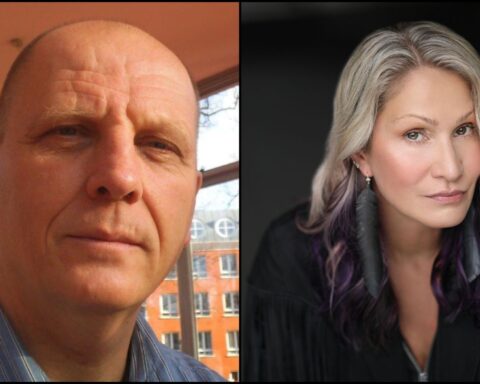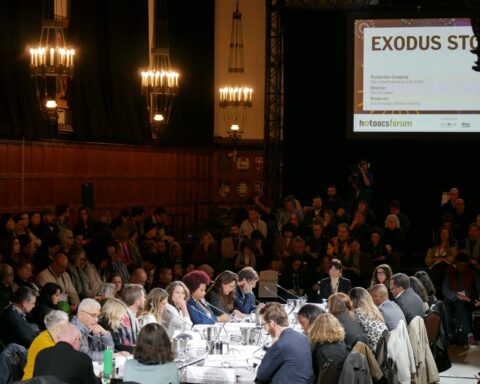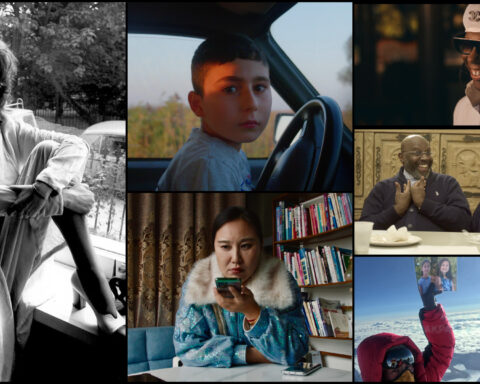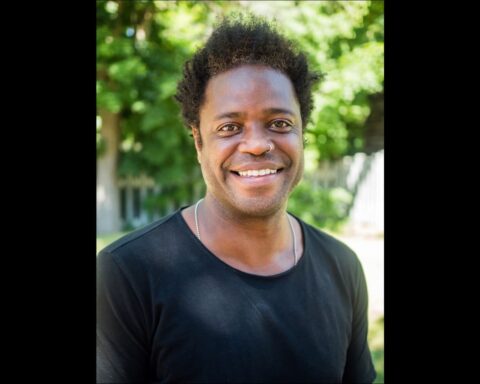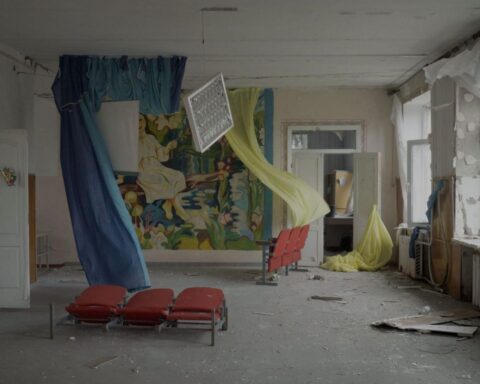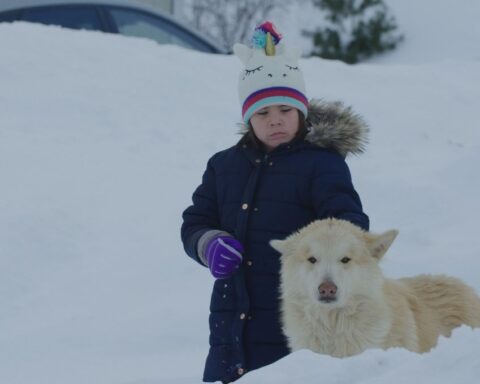The DOC Institute presented its annual honours to two individuals making significant contributions to the field of documentary. A jury of industry peers unanimously selected Hot Docs president Chris McDonald to receive the Rogers-DOC Luminary Award and filmmaker Alethea Arnaquq-Baril (Angry Inuk) to receive the DOC Vanguard Award. The awards were presented at the Garrison Hotel in Toronto on December 1.
McDonald accepted the Rogers-DOC Luminary Award, which is supported by the Rogers Group of Funds and goes to a member of the community who embodies the creative spirit of documentary, in recognition of over 15 years of work supporting documentary with Hot Docs as the festival’s Executive Director and now President. McDonald joked about his efforts in the early days of Hot Docs in which the now wildly popular festival screened at bars and cafés. “I didn’t realise that when I moved to Hot Docs I was joining a community,” said McDonald while accepting the award. “A family of activists, agitators, artists, allies, and friends—and they were all very forgiving.”
“We figured it out as we went along and knew we had to get better every year,” said McDonald, describing the evolution of Hot Docs to POV at the event. “Cafés and bars were a fun way to do it, but with any event, you strive to improve year to year and there was always a new benchmark for us to meet.”
McDonald added that the industry components of Hot Docs helped grow the festival as a public showcase and as a destination professional development alike. “We slowly added industry components over time,” he said. “We grew the parallel streams of the festival—the public events and then the industry programmes like the marking and conference events—and they were always complementary. It was nice to have the industry having access to a public festival because members of industry wanted access to financiers and it was great for financiers to see what the public and our curators responded to as well.”
Last year’s winner of the DOC Vanguard Award, Michael Shannon Michael Shannon John director Chelsea McMullan, presented the honours to Arnaquq-Baril to recognise her growing leadership in the doc community. Arnaquq-Baril’s most recent feature Angry Inuk is the year’s biggest hit on the festival circuit for Canadian documentary having won top honours at imagineNATIVE, RIDM, and Hot Docs where it was the overall audience favourite. McMullan introduced Arnaquq-Baril by praising her balance between artistic expression and activism in Angry Inuk, as well as for her leadership role as an outspoken advocate against the power of negative images, most notably in last year’s controversial RIDM screening of of the North, which brought offensive depictions of the Inuit using stereotypical images selectively harvested from the Internet.
Arnaquq-Baril accepted her award and began by calling POV one of the best film schools she ever had. (We are humbled!) She went on to express her appreciation for having such a strong doc community and she used her experience of life in Nunavut to highlight the power that images have to heal and to harm. “The assumption is that we had to fight to be heard,” said Arnaquq-Baril before noting that Canada’s doc community is one of open ears.
McDonald echoed much of Arnaquq-Baril’s sentiment by adding, “I worked for five years in drama before coming to documentary,” said McDonald. “The people working in documentary are people who care about issues and have developed highly-tuned empathetic skills. There’s a really collaborative nature, too.”
“Part of that,” McDonald adds, “is that over the past few years at Hot Docs, 40 to 50 percent of our guest filmmakers have been women. It’s not a boys’ club like you often see in television and feature films. I think that gender parity helps to make us all mature.”
McDonald replies that the steps toward gender parity happened organically and without a planned agenda from the Hot Docs team. Angry Inuk led a pack of films directed by women at this year’s festival and showed the strength and opportunities for positive images that arise when a diversity of voices gets to create and show their work.
Robin Mirsky, executive director of the Rogers group of funds, which sponsored the Rogers-DOC Luminary Award, explained that, like Hot Docs, Rogers seeks to support a diverse range of filmmakers and stories.” All our decisions are made through a board of directors who work very well together. We cover every topic from A to Z. I don’t think there’s a debate we haven’t touched.”
Arnaquq-Baril adds that more voices in the discussion will ultimately help bring images that are more positive to screens. “It’s been a long tough year to be honest,” said Arnaquq-Baril following the ceremony. When asked about this year’s RIDM panel to address the of the North controversy, the filmmaker said that the struggle for fair representation is ongoing. “I was frustrated with the festival with not talking about us much before the panel,” she explained. “The Inuit were the last people to be asked to be on the panel. At the same festival, there was a panel about Inuit youth and there wasn’t an Inuit on the panel until there was pressure for there to be one.”
The filmmaker hopes that the ongoing reception of Angry Inuk will inspire more people to speak up. “The group of us who have been speaking out have voiced our concerns very clearly and strongly,” she said, “and now it will take non-Indigenous allies to help make festivals realise what is acceptable and what is not. Audiences really seem to be getting it, though, and I’m thankful for that.”
There was an overall note of optimism to the event as several speakers highlighted the proposals and discussions helmed by the current government. Kevin McMahon’s passionate letter to Heritage Minister Mélanie Joly ran throughout the evening with several references appearing in speeches and remarks.
The night’s host, actor and emerging doc-maker Peter Keleghan, echoed this sentiment. “I think the documentary form we have in Canada is so rich and stories in its subconsciousness that I think everyone is better because of it,” he said to POV following the ceremony. Keleghan, whose new doc airs on the CBC January 12, explained how his project illustrates documentary’s position as Canada’s national art form. “It’s a very personal story about my mother who turned 90 this year and my father who is 87 and they both emigrated here as economic refugees in the 1950s,” he reflected. “It’s about my story about adapting to the Canadian ethos and making Canada the best country in the world from my point of view.”
Mirsky added that the current trends in digital production and distribution are part of this optimistic trend for docs. “I think that there’s a real opportunity for documentaries in the non-platform space,” said Mirsky, who watches about a doc a day, whether it’s at lunch at her desk or at home. “People want to program their own viewing, rather than being programmed to, and it’s a matter of looking for the content and finding it. That is more conducive than the process of sitting down at 8 o’clock to watch a documentary, but millennials want to watch them on their own terms and they’re more engaged because of that chance.”
The sense of engagement in the new generation underscored the appropriateness of selection Arnaquq-Baril as the new Vanguard, as Angry Inuk has made some progress in bringing change, partly through its strong activist voice and partly through the overwhelming response from audiences. Arnaquq-Baril adds that groups like the International Animal Welfare Fund, one of the non-profits that Angry Inuk confronts for perpetuating misconceptions about the seal hunt, are slowly acknowledging that Inuit exist but are now acting in subtle ways to lobby for changes in ignorance of how they might impact the Inuit. “Greenpeace, on the other hand,” adds the filmmaker, “while I’m still not happy with them, has been shifting the language and has been working with the Inuit.”




